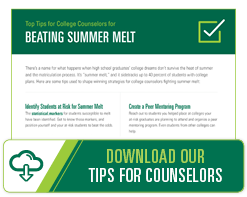Top Tips for College Counselors on Beating Summer Melt
By Joe Emerson | Last Updated: Jul 15, 2022

In community college circles, summer melt is when students who enroll in the spring don’t show up come fall. With four-year colleges, melt is where students commit to school in the spring but never enroll. They say melt stops one-tenth or one-fifth or one-third or up to 40 percent of college-bound students, depending on who’s talking. You, however, know those statistics pile up one person at a time, and those numbers can represent names and faces you know. That’s why we want you to have our top tips for college counselors on beating summer melt.
Typical Causes and Victims of Summer Melt
Among college-bound students, those most susceptible to summer melt are low-income, minority, and/or first-generation students, especially those with a weak college team. Typical causes of melt include:
- Losing the high school support system: Students whose most reliable college team members are teachers and counselors are vulnerable to melt when that connection is lost as classes end.
- Being overwhelmed by the process. Students in dysfunctional families, those with parents who have no postsecondary experience, and those with no traditional family structure are more susceptible to melt.
- Inability to overcome financial obstacles. Too often, this form of melt is enabled by ignorance of available resources.
- Fear of college’s social and academic challenges. You don’t have to be underprivileged to be stressed out about leaving home and friends or feeling unprepared for college-level courses.
In an article titled Prevent Summer Melt, the American School Counselor Association points to specific summer melt stumbling blocks:
- Calculating the costs of college and budgeting
- Understanding financial aid offers
- Signing up for and attending orientation
- Problems with immunizations
- Placement tests
- Dealing with paperwork such as housing forms
- Registering for classes
- Transportation
- Access to the internet during the matriculation process
Counselors get their students in position for the college jump by learning their strengths, weaknesses, and circumstances. That same information can help a counselor who needs to focus time and resources on preparing a student to avoid summer melt.
What Your Students Can Do to Prevent Summer Melt
The best graduation gift you can give students at risk for summer melt is a conversation about how to avoid melting away. Be sure to tell them what it is, and give them some templates for avoiding it:
- Tips from Parent Toolkit on avoiding summer melt
- Tips from the U.S. Department of Education for students at risk for summer melt
What Are the Key Elements of a Summer Melt Strategy?
Summer melt is on colleges’ radars, too, and many schools are responding. Cappex notes that offering “support and engagement throughout the summer before freshman year is the ideal solution” for colleges. That outreach includes electronic messages, from texts to emails, that signal the approach of milestones in the matriculation process and advice on meeting requirements.
That connection with colleges is said to be particularly effective in combating melt, especially when there is a concerted push by high school and college staff.

Here are some tactics used to shape winning strategies for college counselors:
Identify Students at Risk for Summer Melt
The statistical markers for students susceptible to melt have been identified. Get to know those markers, pay particular attention to your statistically at-risk students, and position yourself and those students to overcome summer melt.
Engage with College Admissions Staff on Your Students’ Behalf
It’s essential to interact with admissions offices at colleges popular with your students. Stay connected, and alert admissions officers if you have at-risk students who have chosen their schools.
Your Students Are Wired for the Digital Age, so Connect
As summer and the college enrollment process heat up, use email, texts, social media – whatever it takes – to nudge your students. Let them know you are thinking about them and are available to help.
Use Every Tool You Have to Stay Connected
Communication with your students can survive the end of their senior year. One tactic is to create a newsletter that targets them and their families. It’s an excellent way to keep them aware of matriculation deadlines and offer advice.
Summer workshops for students and parents are another option, with potential topics ranging from avoiding mistakes in the Federal Application for Free Student Aid to why attending college orientation is important.
Create a Peer Mentoring Program
Reach out to students you helped place at colleges that your at-risk graduates are planning to attend, and organize a peer mentoring program. Even students from different colleges can help a rising freshman get through the matriculation process.
Partner with Groups and People Who Can Help You Put a Chill on Summer Melt
Know a financial advisor or firm willing to share time and information? Someone skilled at securing scholarships or financial aid? Nonprofit groups rooted in academics? Recruit them to meet with or mentor your students.
Schedule Summer Events to Connect with Students, Parents
Dream up ways to engage and inform students and parents throughout the summer. The information provided at a FAFSA deadline party or a session on packing for college will be helpful, and the push toward college could be a game-changer.
Become Part of the Summer Melt Solution
If your school district has programs such as Summer Link or uAspire to combat melt, use them; if not, consider a push to create a program.
USF understands the challenges of college counseling. That’s why we provide a Counselor Toolkit, a recruiter information page, and a blog site featuring the College Counselors’ Corner.
And the USF Office of Admissions is ready to engage. Contact us online, or reach us by phone at 813-974-3350.




